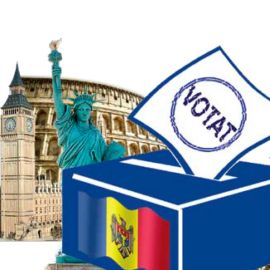back
Polling stations abroad set up without public consultation

The CEC has decided to set up 139 polling stations abroad to be opened in 36 countries. At least 60,030 Moldovans who pre-registered for the presidential elections on 1 November 2020 should vote here.
The Central Electoral Commission (CEC) has decided to set up 139 polling stations abroad to be opened in 36 countries. At least 60,030 Moldovans who pre-registered for the 1 November 2020 presidential elections should vote here. The CEC says the list was approved according to the methodology proposed by civil society. In response, member organisations of the Civic Coalition for Free and Fair Elections argue that public consultations were also necessary before this decision was taken and that the process of adopting the decision was not transparent. Mitrofan Curti is originally from the village of Ciorna, Rezina district, but has been living with his family in the Netherlands for six years, working at the Technical University of Eindhoven. Even though he is far from the country, Mitrofan is exercising his right to vote during the elections in Moldova: "Since 2012 I started my master's degree in Warsaw, Poland, and I have always strived to take advantage of the opportunity to vote. I think in the Netherlands I voted three times". The young man says he and his family will go to vote again this year at the polling station at the Moldovan Mission in The Hague, which is the only polling station in the Netherlands. It's 130 km from home, and the journey takes most of the day, but that doesn't stop Mitrofan, who considers his vote crucial. "We will devote this day entirely to the trip to The Hague. We lose a day, instead we will contribute to a change for our country," he says. CEC decision taken without public consultation When taking decisions on opening polling stations abroad, the authorities must hold public consultations with civil society, take into account the voice of the diaspora and, if necessary, supplement the number of ballot papers, says Mitrofan Curti. "The authorities' methods of communicating with the diaspora about the voting exercise need to change. I am convinced that many more people come to vote than are registered in advance at the polling station. This must be taken into account to avoid cases where ballot papers are exhausted long before the polling stations close," he says. The Civic Coalition for Free and Fair Elections (CALC) urged the CEC in an appeal to hold public consultations on the draft decision to set up polling stations abroad, but these consultations have not taken place. The fears of civil society and voters in the diaspora are linked to the lack of a clear methodology for applying the criteria for the establishment of polling stations and their geographical distribution. "Both the issue of opening polling stations abroad and the issue of polling stations for residents of the Transnistrian region are particularly sensitive, which is why we asked the CEC to hold public discussions and consultations. We are sorry that they were not organized", says Pavel Postica, program director of Promo-LEX. 139 polling stations abroad On September 26, 2020, the CEC decided to open 139 polling stations, with the prior approval of the Ministry of Foreign Affairs and European Integration (MAEIE). The press release mentions the criteria that the electoral authority followed: "Polling stations will be set up in the diplomatic missions and consular offices of the R. Moldova, as well as in other localities, based on the number of voters who participated in the previous elections held in the national constituency, data from the pre-registration, as well as on the information obtained by MAEIE from the competent authorities of the countries of residence of Moldovan citizens on their number and location". During the meeting, Dorin Cimil, CEC Chairman, stated that "the number of polling stations was identified on the basis of the three criteria established in the Electoral Code, (...) and the calculation formula also took into account the methodology proposed by the Association for Participatory Democracy "ADEPT". ADEPT expert: "In a pandemic situation it is difficult to monitor the electoral process" Elena Prohnițchi, an expert at the Association for Participatory Democracy "ADEPT" and secretary of CALC, says that in the absence of public consultations, it is natural to suspect that the process of establishing polling stations abroad was non-transparent and incorrect. "We appreciate that the CEC took our recommendations into account, but public consultations with all stakeholders - diaspora associations, political parties, civil society with expertise in the electoral field - were also necessary. Diaspora associations could have promoted their arguments and parties and civil society could have presented their proposals and got answers to several questions related to the process itself. The organisation of public consultations would not only have been a proof of transparency, but it could also have reduced the criticism that the elections are being rigged and that the CEC is acting in favour of a certain competitor by opening more polling stations in a certain country. However, in a pandemic situation it is difficult to monitor the electoral process and there is a potential risk that the diaspora vote could be rigged in these polling stations," she concluded. According to the CEC, more than 60,000 Moldovan citizens with the right to vote living abroad, as well as those residing in localities on the left bank of the Dniester River (Transnistria), have pre-registered to participate in the presidential elections on 1 November 2020. For polling stations set up outside Moldova, the CEC will allocate no more than 5,000 ballot papers per polling station. In the 2019 parliamentary elections, more than 76,000 citizens voted abroad, but more than 24,000 voters pre-registered. Mariana Jacot, Independent Press Association Have your fundamental rights and freedoms been violated? Call the free "Hotline" 080080030 from landlines or mobile phones and we will help you to be heard and refer you to the relevant public institutions.
